Trma830 quiz 3 - Study guides, Class notes & Summaries
Looking for the best study guides, study notes and summaries about Trma830 quiz 3? On this page you'll find 8 study documents about Trma830 quiz 3.
All 8 results
Sort by
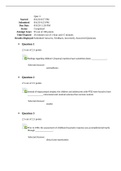
-
Liberty University > TRMA 830/ TRMA830 Quiz 3 Attempt Score 95 out of 100 points
- Exam (elaborations) • 12 pages • 2021
- Available in package deal
-
- $15.49
- + learn more
Liberty University > TRMA 830/ TRMA830 Quiz 3 Attempt Score 95 out of 100 points
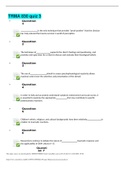
-
Liberty University >TRMA 830/ TRMA830/ TRMA-830; Quiz 3 (answered and graded) all 40 questions answered 100% correctly) 2022
- Exam (elaborations) • 8 pages • 2022
-
- $14.98
- + learn more
TRMA 830 quiz 3 • Question 1 is the only technique that provides “proof positive” that the clinician has truly entered the trauma survivor’s world of perception. • Question 2 The technique of supports the client’s feelings and questioning, and provides and open door for a client to discuss and evaluate their theological beliefs. • Question 3 The use of stimuli to assess psychophysiological reactivity allows maximal control over the selection and presentation of the sti...
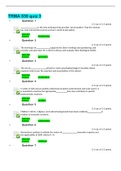
-
Liberty University >TRMA 830/ TRMA830/ TRMA-830; Quiz 3 (answered and graded) all 40 questions answered 100% correctly) 2021
- Exam (elaborations) • 11 pages • 2021
- Available in package deal
-
- $14.49
- + learn more
TRMA 830 quiz 3 • Question 1 is the only technique that provides “proof positive” that the clinician has truly entered the trauma survivor’s world of perception. • Question 2 The technique of supports the client’s feelings and questioning, and provides and open door for a client to discuss and evaluate their theological beliefs. • Question 3 The use of stimuli to assess psychophysiological reactivity allows ma...
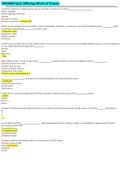
-
TRMA830/ TRMA 830 Quiz Differing Affects of Trauma (already graded) Fall 2021
- Exam (elaborations) • 7 pages • 2021
- Available in package deal
-
- $13.49
- + learn more
TRMA830 Quiz: Differing Affects of Trauma A common method of avoiding extreme pain in traumatic circumstances is that of . Psychic numbing Positive alternate cognitions placebo Incorrect Avoidance (Correct answer found Schupp p. 82) When one has experienced a trauma that is violent, unspeakable, or horrific, it is natural to seek protection both from the of the current event and potential of a similar event. √ memories; harm perpetrator; victim violence; danger harm; fear Judith H...
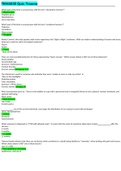
-
TRMA830 Quiz: Trauma; answered, latest Summer 2021_ all answered correct.
- Exam (elaborations) • 6 pages • 2021
- Available in package deal
-
- $10.49
- + learn more
TRMA830 Quiz: Trauma Which part of the brain is synonymous with the term “declarative memory?” √ Hippocampus Cingulate gyrus Hypothalamus Locus coeruleus Which part of the brain is synonymous with the term “emotional memory?” Thalamus Cerebellum Hippocampus √ Amygdala Walter Cannon’s idea that people under stress experiences the “fight or flight” syndrome. With our modern understanding of trauma and stress, what term could we add to his original syndrome? Fissure ...
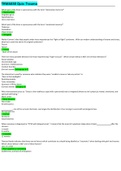
-
TRMA830 Quiz Trauma Question and Answers
- Exam (elaborations) • 6 pages • 2022
-
- $15.49
- + learn more
TRMA830 Quiz: Trauma Which part of the brain is synonymous with the term “declarative memory?” √ Hippocampus Cingulate gyrus Hypothalamus Locus coeruleus Which part of the brain is synonymous with the term “emotional memory?” Thalamus Cerebellum Hippocampus √ Amygdala Walter Cannon’s idea that people under stress experiences the “fight or flight” syndrome. With our modern understanding of trauma and stress, what term could we add to his original syndrome? Fissure...
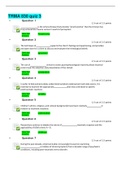
-
TRMA 830 quiz 3
- Exam (elaborations) • 6 pages • 2022
- Available in package deal
-
- $10.48
- + learn more
TRMA 830 quiz 3
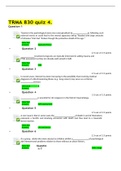
-
TRMA 830 Assessment and Testing in the Treatment of Trauma; all quizzes answered and graded; latest fall 2021 (ace on your studies)
- Package deal • 12 items • 2021
-
- $49.49
- + learn more
TRMA 830 quiz 1 / TRMA830 quiz 1 (answered) all answers correct. RMA-830 quiz 4/ TRMA 830 quiz 4 Liberty University > TRMA 830/ TRMA830 Quiz 3 TRMA830/ TRMA 830 Quiz Differing Affects of Trauma TRMA 830 quiz 1 study review TRMA830 Quiz: Trauma; answered TRMA830 QUIZ Diagnosis and Assessment TRMA830 QUIZ Diagnosis and Assessment TRMA-830 ;

How much did you already spend on Stuvia? Imagine there are plenty more of you out there paying for study notes, but this time YOU are the seller. Ka-ching! Discover all about earning on Stuvia


